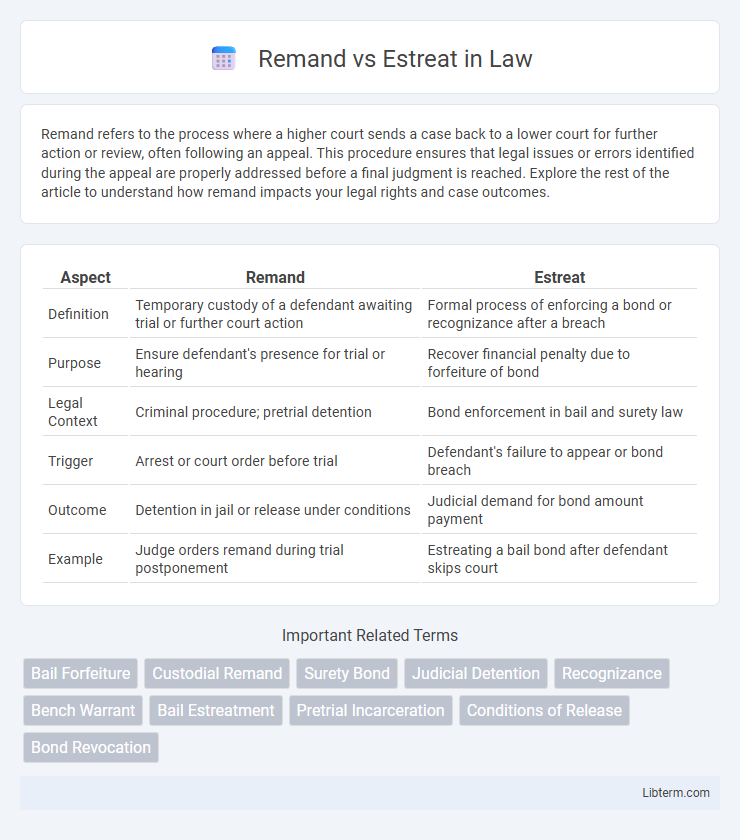Remand refers to the process where a higher court sends a case back to a lower court for further action or review, often following an appeal. This procedure ensures that legal issues or errors identified during the appeal are properly addressed before a final judgment is reached. Explore the rest of the article to understand how remand impacts your legal rights and case outcomes.
Table of Comparison
| Aspect | Remand | Estreat |
|---|---|---|
| Definition | Temporary custody of a defendant awaiting trial or further court action | Formal process of enforcing a bond or recognizance after a breach |
| Purpose | Ensure defendant's presence for trial or hearing | Recover financial penalty due to forfeiture of bond |
| Legal Context | Criminal procedure; pretrial detention | Bond enforcement in bail and surety law |
| Trigger | Arrest or court order before trial | Defendant's failure to appear or bond breach |
| Outcome | Detention in jail or release under conditions | Judicial demand for bond amount payment |
| Example | Judge orders remand during trial postponement | Estreating a bail bond after defendant skips court |
Introduction to Remand and Estreat
Remand refers to the legal process where a case is sent back from an appellate court to a lower court for further action or reconsideration. Estreat involves the enforcement or forfeiture of a bond or recognizance, often ensuring compliance with court conditions. Both terms are essential in judicial procedures, with remand relating to case handling and estreat addressing bond enforcement.
Definition of Remand
Remand refers to the act of sending a case back from a higher court to a lower court for further action or reconsideration. It often occurs when the appellate court finds that the lower court's decision lacked sufficient evidence, procedures were flawed, or legal errors were made. Remand ensures the trial is conducted in accordance with proper legal standards and allows for additional evidence or arguments to be presented.
Definition of Estreat
Estreat refers to the official process of extracting a forfeited bond or sum of money from a surety or guarantor as a penalty when the principal fails to fulfill a legal obligation, often used in bail bond enforcement. It involves converting the bond into a debt payable to the government or court, effectively enforcing compliance through financial consequences. Unlike remand, which involves detaining a suspect, estreat specifically targets the financial guarantee associated with legal proceedings.
Legal Basis for Remand
The legal basis for remand lies in the authority granted to courts to detain a suspect or accused person during the investigation or trial to ensure their presence and prevent interference with evidence. Remand is typically governed by specific provisions in criminal procedure codes, such as Rule 70 of the Revised Rules of Criminal Procedure in the Philippines, which mandates judicial authorization and adherence to prescribed periods for detention. This measure safeguards the integrity of the judicial process while balancing individual rights against public interest and security concerns.
Legal Basis for Estreat
Estreat refers to the legal process of enforcing a forfeited bond or security, typically arising from a failure to appear in court or comply with a condition of release, grounded in statutory laws that authorize courts to recover the amount pledged. The legal basis for estreat is often found in state or jurisdiction-specific penal codes or court rules that outline procedures for the forfeiture and collection of bond amounts. Remand, by contrast, involves the detention of a defendant pending trial, distinct from estreat's focus on financial enforcement following non-compliance.
Key Differences Between Remand and Estreat
Remand refers to sending a case back to a lower court for further action or reconsideration, often after an appeal or legal review. Estreat involves the forfeiture of a bail bond or financial guarantee due to a failure to appear in court or comply with bail conditions. The key difference lies in remand being a procedural judicial action to revisit a case, while estreat is a financial enforcement mechanism triggered by non-compliance with court orders.
Situations When Remand is Applied
Remand is applied primarily when appellate courts find errors in legal procedures or evidentiary rulings during the trial, necessitating a return to the lower court for further action. It commonly occurs in criminal cases where new evidence emerges or when a defendant's rights may have been compromised, requiring the court to reexamine the case. Estreat, by contrast, involves the formal seizure or enforcement of a bond or surety, often unrelated to trial corrections but focused on financial guarantees.
Circumstances Leading to Estreat
Estreat occurs when a conditional bond, such as a bail bond, is forfeited due to the accused's failure to comply with court appearances or legal obligations. Circumstances leading to estreat typically involve the defendant absconding, missing scheduled court dates, or violating bond conditions. This process enables the court to enforce penalties by converting the bond into a monetary judgment against the surety or defendant.
Implications for Defendants and Sureties
Remand requires defendants to remain in custody pending trial, imposing restrictions on their liberty and potentially impacting their ability to prepare a defense, while estreat involves the forfeiture of a surety bond when defendants fail to appear in court, resulting in financial losses for sureties. Defendants face prolonged detention under remand, whereas sureties bear the risk of losing posted bail under estreat, incentivizing them to ensure the defendant's compliance with court conditions. The implications highlight contrasting pressures on defendants' personal freedom and sureties' financial responsibility within the judicial process.
Conclusion: Choosing Between Remand and Estreat
Selecting between remand and estreat hinges on the case context and judicial objectives. Remand returns the case to a lower court for further action, ensuring detailed case review. Estreat involves enforcing a financial guarantee, typically forfeiting bail, emphasizing accountability over case reevaluation.
Remand Infographic

 libterm.com
libterm.com